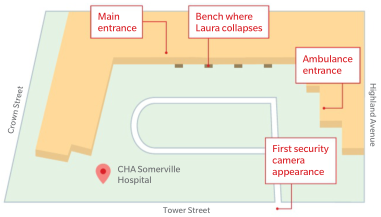Laura was an amazing communicator—a journalist—and, with her life on the line, she didn't waste a single word.
勞拉是個很棒的溝通者,一位記者,在她命懸一線時,沒有說一句廢話。
If only she had been talking to the right person. Laura's cell phone call was routed to a regional 911 operator.
要是合適的人接了她的電話就好了。勞拉的電話被轉(zhuǎn)到了一個區(qū)域911接線員那里。
The operator, sitting in a Massachusetts State Police operations center some 18 miles away, was merely a call screener who couldn't send help.
這位接線員位于18英里外的馬薩諸塞州警察行動中心,他只是一個無法提供幫助的電話篩查員。
When Laura finished speaking, the operator told her to stay on the line as she connected Laura to the local police.
勞拉講完后,接線員讓她不要掛斷電話,她讓勞拉和當(dāng)?shù)鼐爝B線。
When the police picked up, a new operator asked her to explain all over again what her emergency was.
警察接通電話后,一位新的接線員讓她再描述一下她的緊急狀況。
But by then, she could barely speak. "She's outside of the Somerville Hospital," said the regional operator, jumping in. "She's having an asthma attack.
但是到那時,她已經(jīng)基本說不出話了。“她在薩默維爾醫(yī)院外面,”當(dāng)?shù)亟泳€員接著說。“她哮喘發(fā)作了。
She can't get into the hospital." It should have been so easy for the two operators to locate Laura, since both had her cell number.
她進(jìn)不去醫(yī)院。”兩位接線員本來應(yīng)該很容易找到勞拉,因為他們都有她的手機號碼。
A satellite ping of her GPS coordinates provided by her carrier would make Laura a digital dot on their computer-screen street maps.
由勞拉的載波提供的GPS坐標(biāo)的衛(wèi)星聲脈沖將使她成為一個小點,出現(xiàn)在他們電腦屏幕上的街道地圖上。
But, as can be the case with cell phone 911 calls, her location on their screens was wrong.
但是,比如在撥打911電話時,屏幕上顯示的她的位置是錯誤的。
When you use an app involving your location, your phone constantly transmits where you are, like a homing beacon.
當(dāng)你使用一個與你的位置有關(guān)的應(yīng)用程序時,你的手機會不斷發(fā)送你的位置信息,就像一個歸航信號一樣。
But when you make a 911 call, that doesn't happen.
但是當(dāng)你打911電話時,它不會發(fā)送你的位置信息。
Instead, a satellite must be pinged, and that information is integrated with other bits of data to trace where you're calling from, a more complex and often inexact process.
相反,必須對衛(wèi)星發(fā)送聲脈沖,并將這些信息與其他數(shù)據(jù)進(jìn)行整合,才能追蹤你的通話位置,這是一個更為復(fù)雜且常常不精確的過程。
Laura's ping registered at 68 Tower Street, a street corner some 200 feet from the hospital's front door.
勞拉的聲脈沖顯示的位置是塔街68號,一個距離醫(yī)院前門約200英尺的街角。
Somerville's police dispatcher asked Laura to clarify where she was.
薩默維爾的警察調(diào)度員要求勞拉澄清她的位置。
"Ma'am, where are you located there? You're the one— you're at 230 Highland Avenue, right?"
女士,你在哪里?你就是那個——你在高地大道230號,對吧?”
That's the hospital's official mailing address, on a completely different side of the building.
那是醫(yī)院的官方通訊地址,在大樓的另一邊。

But it was the only address the dispatcher had.
但這是調(diào)度員唯一能獲取的地址。
It would have been the perfect moment for the original 911 operator to have relayed more information,
這本來是一開始那個911接線員傳遞更多信息的絕佳時機,
such as the fact that Laura twice said she was outside the emergency room, or that she twice said she was dying.
比如勞拉兩次說她在急診室外面,或者兩次說她快死了。
But that operator had already hung up. In the 911 tape, you hear Laura's voice again.
但是接線員已經(jīng)把電話掛了。在911的錄音帶中,可以再聽到勞拉的聲音。
"I'm outside," she starts to say, before struggling to make another sound.
她開始說,“我在外面。”然后就再奮力發(fā)出聲音。
It is 4:25 a.m. and 36 seconds. It is the last time Laura speaks. It was the moment her life hinged upon.
那是凌晨4點25分36秒。勞拉最后一次說話。那是她的生命的轉(zhuǎn)折點。
Within a minute or so, her heart would stop beating, and oxygen would stop going to her brain.
在大約一分鐘內(nèi),她的心臟停止跳動,氧氣也停止進(jìn)入她的大腦。
On the surveillance video, about 30 seconds later, Laura slumps on the stone bench, her arms falling to her sides.
在監(jiān)控錄像中,大約30秒后,勞拉癱倒在石凳上,雙臂垂在身體兩側(cè)。



